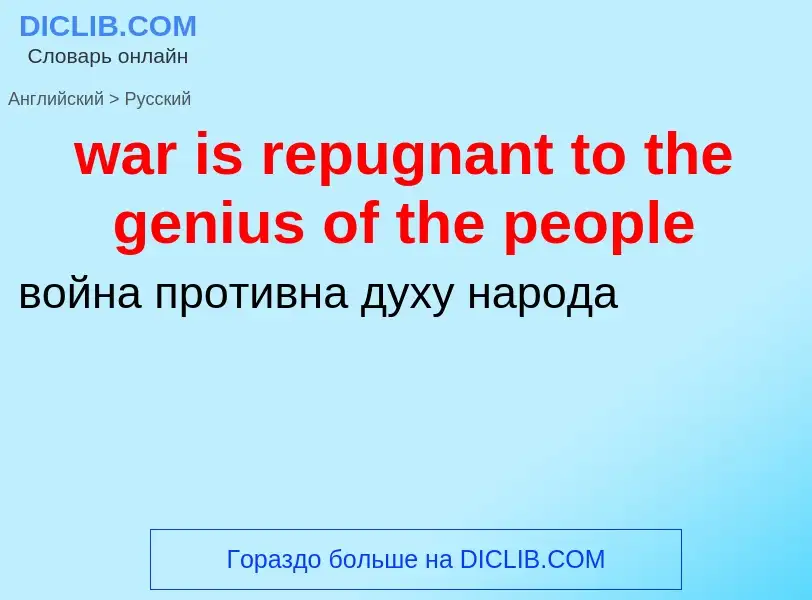Μετάφραση και ανάλυση λέξεων από την τεχνητή νοημοσύνη ChatGPT
Σε αυτήν τη σελίδα μπορείτε να λάβετε μια λεπτομερή ανάλυση μιας λέξης ή μιας φράσης, η οποία δημιουργήθηκε χρησιμοποιώντας το ChatGPT, την καλύτερη τεχνολογία τεχνητής νοημοσύνης μέχρι σήμερα:
- πώς χρησιμοποιείται η λέξη
- συχνότητα χρήσης
- χρησιμοποιείται πιο συχνά στον προφορικό ή γραπτό λόγο
- επιλογές μετάφρασης λέξεων
- παραδείγματα χρήσης (πολλές φράσεις με μετάφραση)
- ετυμολογία
war is repugnant to the genius of the people - translation to ρωσικά
общая лексика
почетное гражданство и вытекающие из него привилегии
Ορισμός
Βικιπαίδεια

Opposition to the War of 1812 was widespread in the United States, especially in New England. Many New Englanders opposed the conflict on political, economic, and religious grounds. When the Embargo Act of 1807 failed to remedy the situation with the United Kingdom, with Britain refusing to rescind the Orders in Council (1807) and the French continuing their decrees, certain Democratic-Republicans known as war hawks felt compelled to persuade the United States government to declare war on the British. A number of contemporaries called it, "The second war for independence." Henry Clay and John Calhoun pushed a declaration of war through Congress, stressing the need to uphold American honor and independence. Speaking of the impact of the depressed cotton trade upon his fellow Southerners, Calhoun told Congress that:
- They see, in the low price of their produce, the hand of foreign injustice; they know well without the market to the continent, the deep and steady current of supply will glut that of Great Britain; they are not prepared for the colonial state to which again that Power [Great Britain] is endeavoring to reduce us. The manly spirit of that section of our country will not submit to be regulated by any foreign Power.
Vehement protests against "Mr. Madison's War" erupted in those parts of the country where the opposition party, the Federalists, held sway, especially in Connecticut and Massachusetts. The governors of these two states, along with Rhode Island, refused to place their state militias under federal control for duty outside the territory of their respective states. In the ensuing 1812 and 1813 United States House of Representatives elections, some members of Congress who voted for the war paid the price. Eight sitting New England congressmen were rejected by the voters, and several others saw the writing on the wall and declined to seek re-election. There was a complete turnover of the New Hampshire delegation.

![An engraving of [[Timothy Pitkin]], the leader of the [[Federalist Party]] during the [[War of 1812]]. An engraving of [[Timothy Pitkin]], the leader of the [[Federalist Party]] during the [[War of 1812]].](https://commons.wikimedia.org/wiki/Special:FilePath/TimothyPitkin.jpg?width=200)
![A recipient of Freedom of the City of London, [[Nigel Cumberland]], after his ceremony A recipient of Freedom of the City of London, [[Nigel Cumberland]], after his ceremony](https://commons.wikimedia.org/wiki/Special:FilePath/A recipient of Freedom of the City of London.jpg?width=200)
!["Ferdinand Receives the Keys of the City from the Virgin of Ghent", print after a painting made by [[Antoon van den Heuvel]] for the [[Joyous Entry]] by the [[Cardinal-Infante Ferdinand]] into [[Ghent]] in 1635 "Ferdinand Receives the Keys of the City from the Virgin of Ghent", print after a painting made by [[Antoon van den Heuvel]] for the [[Joyous Entry]] by the [[Cardinal-Infante Ferdinand]] into [[Ghent]] in 1635](https://commons.wikimedia.org/wiki/Special:FilePath/Antoon van den Heuvel - Ferdinand Receives the Keys of the City from the Virgin of Ghent.jpg?width=200)
![[[Ari Norman]]'s Certificate of Freedom of the City of London [[Ari Norman]]'s Certificate of Freedom of the City of London](https://commons.wikimedia.org/wiki/Special:FilePath/Certificate of Freedom of the City of London for Ari Norman.jpg?width=200)
![Russian President]] [[Dmitry Medvedev]] receives the Golden Key to the City of [[Madrid]] during a state visit. Russian President]] [[Dmitry Medvedev]] receives the Golden Key to the City of [[Madrid]] during a state visit.](https://commons.wikimedia.org/wiki/Special:FilePath/Dmitry Medvedev in Spain 2 March 2009-8.jpg?width=200)
![Award to [[Sir Robert Hadfield]] by the [[City of Sheffield]], 1939 (Hadfield Room, [[University of Sheffield]]) Award to [[Sir Robert Hadfield]] by the [[City of Sheffield]], 1939 (Hadfield Room, [[University of Sheffield]])](https://commons.wikimedia.org/wiki/Special:FilePath/Hadfield Freedom of the City of Sheffield.jpg?width=200)
![Reyes]]. Reyes]].](https://commons.wikimedia.org/wiki/Special:FilePath/Jeanine Áñez at the 314th Anniversary of Reyes. 6 January 2020, Ministry of Communication, Reyes (51907629988).jpg?width=200)

![Mark Stephens]] with a sheep on [[London Bridge]] in 2009 Mark Stephens]] with a sheep on [[London Bridge]] in 2009](https://commons.wikimedia.org/wiki/Special:FilePath/Mark Stephens freeman.jpg?width=200)
![Members of [[No. 28 Squadron RAAF]] marching through the centre of [[Canberra]] during the unit's Freedom of the City parade in August 2013 Members of [[No. 28 Squadron RAAF]] marching through the centre of [[Canberra]] during the unit's Freedom of the City parade in August 2013](https://commons.wikimedia.org/wiki/Special:FilePath/No 28 Squadron passing the official party during its Freedom of the City Parade in August 2013.jpg?width=200)
![Carnival 2018]]. Carnival 2018]].](https://commons.wikimedia.org/wiki/Special:FilePath/Rei Momo recebe chave da cidade e abre carnaval no Rio (3738).jpg?width=200)

![Sir [[Tim Berners-Lee]] receiving the freedom of the [[City of London]] in 2014 Sir [[Tim Berners-Lee]] receiving the freedom of the [[City of London]] in 2014](https://commons.wikimedia.org/wiki/Special:FilePath/Tim Berners-Lee Freedom of the City - 06.jpg?width=200)
